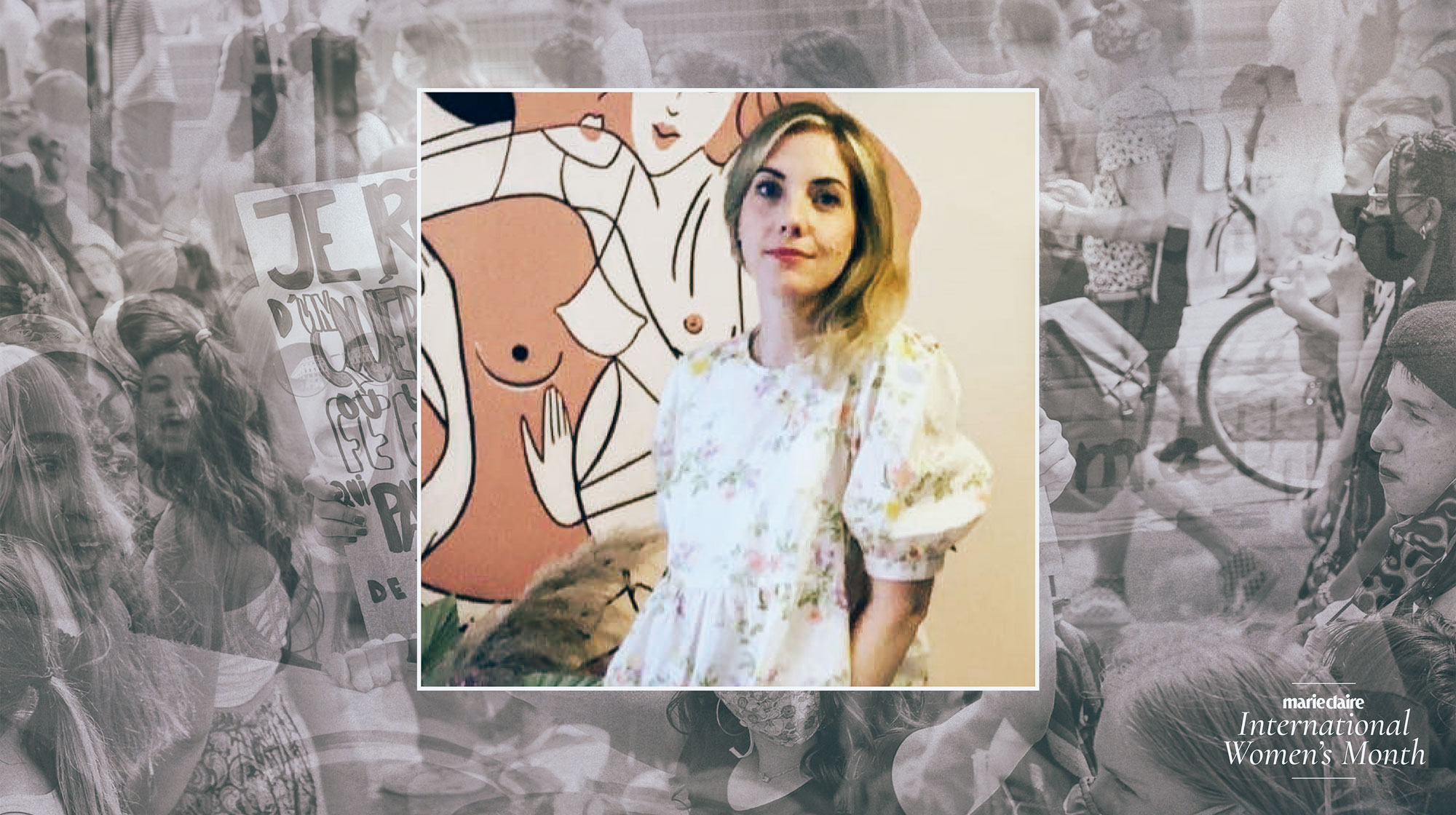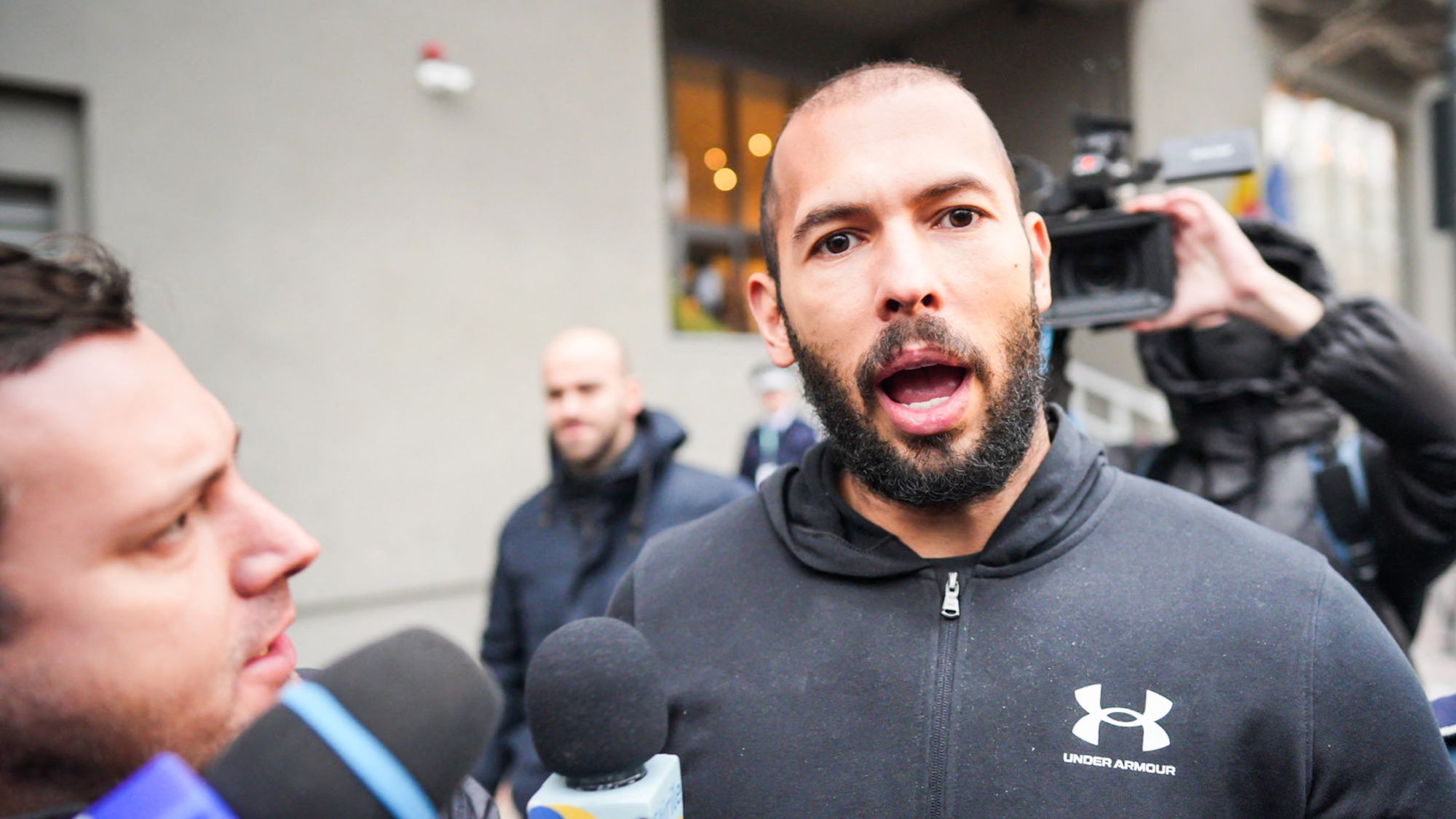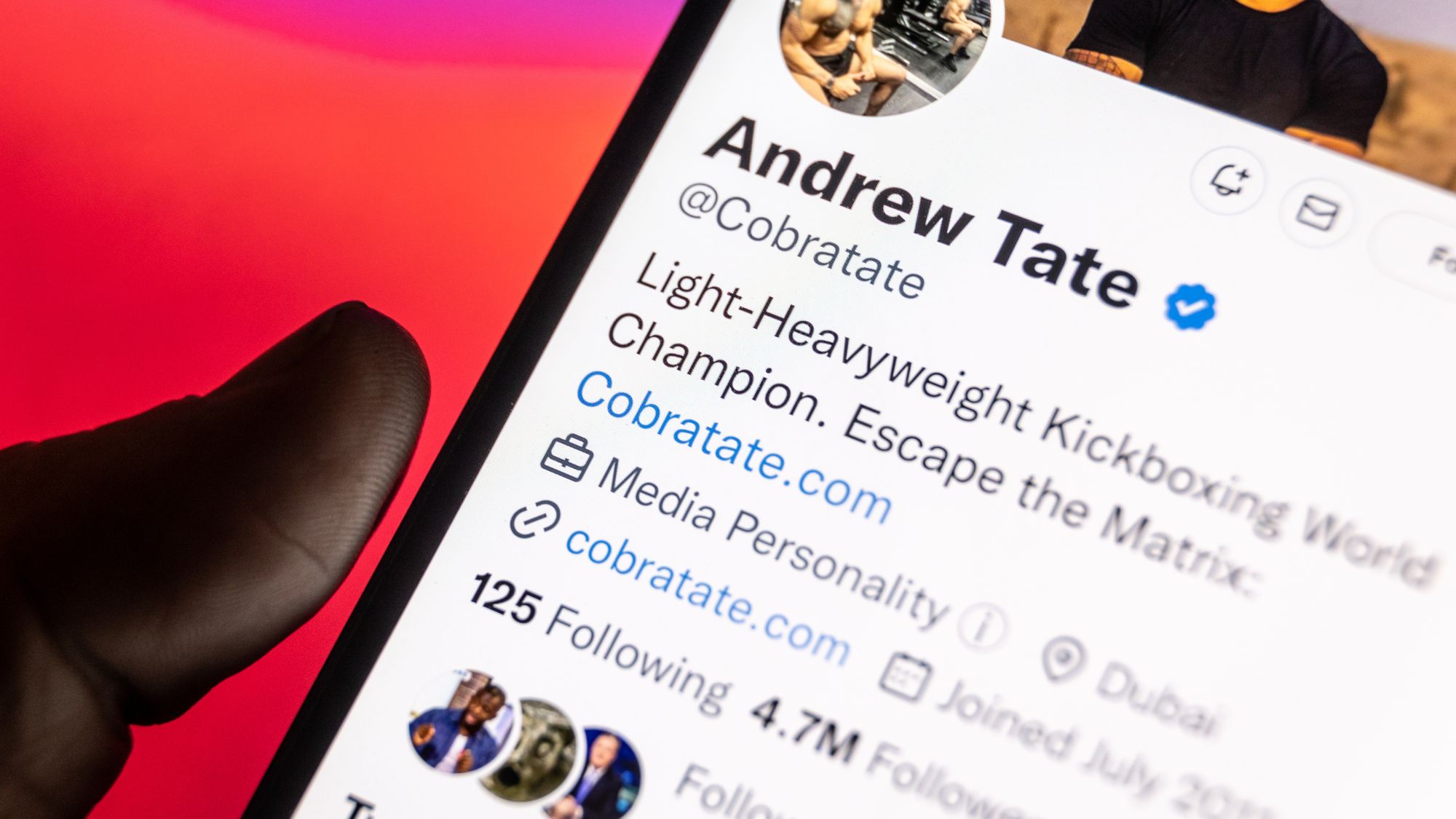Karen Whybro: "Why is TikTok platforming misogynistic influencers, but censoring women's rights activists?"
As part of our Action Against Misogyny series, Karen Whybro shares her experience of online abuse and being censored on TikTok.


Celebrity news, beauty, fashion advice, and fascinating features, delivered straight to your inbox!
You are now subscribed
Your newsletter sign-up was successful
Online misogyny is a growing threat in the UK, with social media algorithms driving hate speech and elevating misogynistic influencers. Moreover, these harmful figures are now reportedly learning to manipulate these systems in order to elevate their videos and target feminist creators.
This was the case for Karen Whybro, a women's safety consultant, who uploaded informative videos under the popular handle, @NotAllMen. After just two months on the platform however, Karen was targeted by online abuse and left fearing for her safety. She was 'doxxed' - a form of cyberbullying where people leak your personal information online, and later 'rage farmed' - with the manosphere reporting her videos en masse, prompting her immediate ban from TikTok.
Karen's account remains permanently banned to this day, while the misogynistic influencers spreading hate are still free to have their platforms.
Now more than ever we need to protect women and girls online, and this International Women’s Day, we are calling for action.
This week, we will be joining forces with three women’s rights activists, releasing a series of in-depth interviews about the threat of online misogyny and how to navigate it.
Here, Karen Whybro tells Features Editor Jenny Proudfoot about her experience on TikTok, and how social media is seemingly platforming misogynistic influencers, but censoring the women’s rights activists calling them out.
A post shared by Karen Whybro (@karen.whybro)
A photo posted by on
You have first-hand experience of online misogyny, particularly on TikTok…
Celebrity news, beauty, fashion advice, and fascinating features, delivered straight to your inbox!
Online misogyny is definitely something that was on my radar before I started my campaigning around women's safety. But when I joined TikTok, I experienced the very worst of it because I was putting out my own feminist lens on everything. My account was called @NotAllMen, so it was about trying to have a conversation about women's rights without men getting defensive and saying that bloody phrase. I was making video content around topics like the gender pay gap, women's safety, violence against women and girls, gender stereotypes etc., but I never engaged in anything that was offensive or harassment. Some creators with big platforms do a lot of the “men are trash” kind of content, but I would say mine was really moderate - more informative, looking at statistics and evidence. And funnily enough, those videos were actually the ones where men got the most irate. They really didn’t like it when I talked about the gender pay gap.
And you then quickly became a target for online abuse…
I would be ‘stitched’ quite a lot, or they would just screen record my video and make their own about it. That was both men and women doing that - and I’d normally be alerted to it by someone else. Then there were the comments. It started with the typical “you're old and single”, “you can't keep a man”, “you need a shag”, “you're going to die alone with cats”. You know, stupid, childish stuff. But then it became more serious and turned into: “women like you should have your ovaries cut out”, “you shouldn't be a parent” and “I hope someone sends you a pipe bomb”. I was scared when somebody used my real name - I was ‘doxxed’ by a female men’s rights activist and she was telling people that she knew me. I’ve got quite an unusual name and with my business as well, I’m quite easy to find online. It wouldn't be hard to find my address - put it that way. I definitely never talked about my daughter on there - that would have made me really anxious. And I’m not some kid - I’m 44. I can handle myself and will happily debate or argue with people about what I believe to be right. But I felt really strongly when I joined TikTok especially, that there is a huge issue with the platform not doing enough to keep women safe. And while on there, I was actually fearful for my safety.
What were the safety issues that you experienced on TikTok?
What I found was twofold - firstly, that the level of abuse on TikTok is off the charts. The abuse is quite open, it’s not really addressed by the platform and the reporting system is flawed, which means that they don't take videos down that even incite violence quite openly and explicitly against women. People then manipulate that reporting system and target feminist creators. I was permanently banned, and three or four of my friends have experienced this too. This is because - and I think they’ve recently changed this, but they had a kind of 'three strikes and you're out’ rule where if you got reported a number of times, you’d just get banned. So even though my content was restored on appeal, I still have a permanent ban. Whereas the creators that I've highlighted in the media are still there and free to have a platform. So it's not just the abuse from individuals, it's the kind of collusion from the social media platforms, in that they don't respond effectively to people's concerns. And they don't take action against some of the creators who are quite clever now in existing within the guidelines, but being very misogynistic. This I believe is quite dangerous, particularly their rhetoric around how they are training young men to behave.

But surely these misogynistic influencers would have got more than three strikes against them...
There's definitely something really funny going on, and I don't think any of us have really got to the bottom of it. Other than one tactic that they use called ‘Rage Farming’, which is so shocking that it sounds made up. What they'll do is create a video about you and then they'll get all of their followers - and these people have usually got really big followings - to report you en masse. That happened to me on my third strike - I had something like 100 videos all reported within 12 hours, and so then that just prompts an immediate ban. But, they don't have that same audience who are reporting them collectively and repeatedly. There is also another theory - which I think is right, that once someone gets over a certain amount of followers and they start to monetize their account, they get a certain level of protection from TikTok. We all know that if you're a social media user, you're the commodity, and so if people get big accounts and become verified on there, the platform is not going to want to take them down. And the thing that’s really scary is that because people share other users’ content so much on TikTok, banning someone - even banning Andrew Tate - doesn’t have much purpose. Because all his videos are still on there, they’re just on there shared by other people. So, that's a real flaw and I don't think TikTok have a handle on that at all.
Why does online misogyny seem to be particularly prevalent on TikTok?
I think there are some issues with TikTok that don't exist with other platforms, but it happens a lot on YouTube too, as well as their underground discord servers. But the thing with TikTok is that the algorithm pushes content to people quicker, and it pushes people down rabbit holes a lot more effectively. Then there are also some big flaws on the platform - the reporting system flaw that I mentioned before, but also the fact that if you block somebody, they can then just create a new account. Whereas if I blocked somebody on Instagram for example, they can't then create a new account with that same IP address. So, it's got a slightly more stringent security element to it.
Andrew Tate is a self-proclaimed misogynistic influencer and has been dubbed the “King of toxic masculinity”...
Andrew Tate is just a product of our society - a society that allows someone to very openly talk about women as commodities. He’s an individual who's become immortalised, but really the reason young men and boys followed him wasn't because of his misogyny, it was because of his power and his wealth. He's a con man at the end of the day, and we know that unfortunately that kind of ‘get rich quick’ scheme does appeal to people. So if you've got marginalised and disenfranchised young men and boys who start consuming that content, they will get redirected quite quickly and to worse types of content. But Andrew Tate wouldn't exist if we didn't have a society where it was OK to openly speak about moving countries to avoid rape convictions.
Are we putting too much focus on Andrew Tate, and overlooking the wider extent of online misogyny?
Yeah, I think the focus on Andrew Tate is sometimes a bit misguided, because it doesn't actually focus on the real issue, it just focuses on him. And if he goes away, the problem won’t go away. In fact, he unfortunately could then just be elevated to a higher position, because people are buying into this conspiracy theory idea that he foresaw his arrest, and that this is an attack on free speech.
A post shared by Karen Whybro (@karen.whybro)
A photo posted by on
As increasing numbers of young boys are being radicalised by incel ideology, what can we do?
We need to work out how to help boys because at the end of the day, they're victims of it as much as girls. And we need to work out how to avoid radicalising them further. That's something that I don’t think people have quite got their heads around yet. The men's rights activists spend a lot of time saying that boys are demonised, that all we tell them is how worthless they are and that that’s why they’re behaving like this. Now, I don't agree with that, but I do think we are in danger of further radicalising boys if we don't have a real, open and honest conversation about what's going on. So I think that’s the difficult bit at the moment - working out what approach to take with boys and young men to try and get them to understand that this isn't the norm. But also to understand that they are being fed this information for another reason, that it's not healthy and that it's not something that we want to encourage. It’s not just the young boys though - I’m also really concerned at the number of grown men that I'm seeing defend Andrew Tate for example, and just buying into this nonsense conspiracy theory that he's created.
And this harmful online activity that we’re seeing must be leading to offline consequences…
Absolutely. We've had it recently in the Plymouth shooting, who was known to have been influenced by incel ideology. There’s a big crossover with domestic violence, and if you look at domestic homicide there’s a rise in sons killing mothers at the moment, so I think people are starting to take notice of it. It’s also the coercive control element of incel ideology that is quite insidious and very dangerous because it’s hard to spot. It's hard for people to recognise and it's hard to prosecute, and so you've got all of those angles to it as well. But yes, I think over the next few years, we will definitely see real life examples of violence being played out much more frequently.
Do you think people are being complacent about online misogyny?
I think people are ignorant, and I don't know if that's deliberate. I'm really concerned about the generational gap between my generation - many of whom have preteen and teenage children, and they don't have a clue what their children are consuming online. Or how dangerous the algorithms are in terms of delivering that content to children in quite an effective way. It's just beyond most people's understanding - especially if you didn't grow up with social media. Teenagers now have grown up with their entire lives being online. They’ve just normalised it, and it has become part of their life. But I think the gap exists - that parents possibly don't know how much of an influence that's having, or really have an idea on how it's affecting them.

Young men are being radicalised and women are being put in danger, so what are the solutions?
I think the government really needs to look at legislation against the social media companies. I know they've backpedalled a lot on the Online Safety Bill, which is a real shame - they’re not taking it seriously enough. They are not including online abuse, and don’t seem to want to make social media companies responsible for that. So, the social media companies can just go, “It's not our fault what people put on our platform - it’s not us saying it so we're not liable”. Until that loophole is cut, they're never going to have to take responsibility for what's on their platforms, so that’s a huge issue. Schools also need to get a better handle on what young people are consuming - as do social workers and of course parents. All of these agencies that have the ability to recognise the signs really need to get a handle on it, and understand it. That’s part of what I'm saying about this generational gap - I don't think the people in positions of power really have the understanding of what's going on online.
What can we do on an individual level to tackle online misogyny?
I would say to stop using social media, but I know that’s not realistic. So I think probably just having day to day conversations, because everything online isn't real and it's important for young people to understand that. There’s a phrase that people use on TikTok actually, which is “touch grass”, as in, go and reconnect with the real world. And I think that's really important - to live in the real world and to have conversations with the immediate people around us about it. So that young boys realise that women aren't the enemy, nor are they there for men’s pleasure - we really need to reduce that male entitlement. There is so much that could be spoken about around the dinner table, rather than learning about it from social media.
Would you ever return to TikTok?
TikTok is not interested in resolving people’s problems. They've never once engaged with me. And despite the fact that I had three articles in the paper about my experience on the platform, I still get a generic message saying, “Hi, just tap the help button on your profile”. Well, I'm permanently banned, so actually, I can't do that. I could technically set up another account today, but why would I do that? I live on my own, I've got a seven-year-old, I know that people can find my address if they want to, and I'm just not taking that risk. I really didn't think that I would be this scared by people online. I was so shocked at the hostility and the aggression on TikTok.
Follow our Action Against Misogyny series @MarieClaireUK.

Jenny Proudfoot is an award-winning journalist, specialising in lifestyle, culture, entertainment, international development and politics. After working at Marie Claire UK for seven years - rising from intern to Features Editor - she is now a freelance contributor to the News and Features section.
In 2021, Jenny was named as a winner on the PPA's '30 under 30' list, and was also listed as a rising star in journalism.